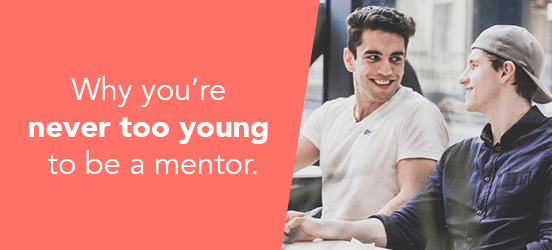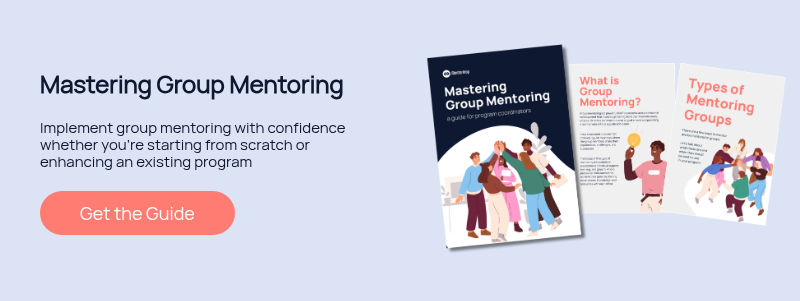You don’t need 15 years of experience to be a mentor.
You’re never too young to be a mentor. No matter what stage of your professional path you are on, you can be a valuable mentor to someone else. Every person is at an important juncture in their personal and professional lives that other people will be going through soon.
Who’s most qualified to give someone advice about how to enter the workforce?
Not the guy who has been an executive for 20 years; it’s the person who entered the workforce a few years ago. They can relate, the times and processes were similar, and they can provide great insights and advice about how they navigated the exact same juncture.
The average age of a mentor is only 31 years old.
The perfect mentor is only one step ahead. – typically an average of 1-5 years ahead of their mentee.
Mentoring has evolved from being rigid and traditional to modern and dynamic. The forms of mentoring below speak to the fact that everyone can and should be a mentor, at almost every stage of their career.
Peer Mentoring
Peer mentoring is the one-on-one approach to mentoring, which places a focus on a specific area of expertise. A mentee is then assigned a more experienced peer (typically is slightly older) who has a job at the same level. This relationship encourages a reciprocal learning environment and creates a sense of community with your mentoring relationship. Peer mentoring can help both participants overcome an important event and allow them to share their experience and advice.
Here’s an example of how this would work. Take, for instance, two software engineers who started at the same company within months of each other. One has a strong background in front-end design, while the other specializes in back-end architecture. By regularly meeting to share insights, offer feedback on each other’s work, and troubleshoot code collaboratively, they both grow faster and feel more supported. Peer mentoring like this fosters a culture of continuous learning, camaraderie, and fosters strong team trust.
Group Mentoring
Group mentoring involves either one mentor in charge of multiple mentees or one mentee who has multiple mentors. Group mentoring effectively strengthens the relationships between all participants involved and encourages a natural exchange of information in a team-based environment. Group mentoring allows different ideas to be shared among the members of the program and provide unique advice to the mentees.
There are several ways to make group mentoring work for your organization. For a healthcare organization, this could take the form of a monthly roundtable for junior nurses, guided by a rotating group of senior nurses and administrators. These group mentoring sessions allow participants to learn not only from the mentors but also from their peers’ experiences and questions. Sharing challenging patient communication issues can spark discussion that can help multiple people in the group adopt new strategies in their practice.
Reverse Mentoring
In reverse mentoring, the roles of traditional mentoring are reversed. A younger person becomes the mentor, while the mentee is typically an older person. This relationship acts as a “two-way street” and encourages both parties to teach and learn. Both members of the mentoring relationship are able to then grow as individuals and develop a stronger relationship. For example, a younger employee may be able to teach an older employee about modern technology.
A way this could work for an organization like a major retailer is by inviting new sales associates to mentor seasoned department managers by sharing insights from their daily customer interactions. While department managers have more experience and have a more big picture view, sales associates’ front-line perspective helps highlight emerging trends and shifting customer expectations that managers might miss.
As associates mentor team leaders on things like emerging trends, changing customer expectations and behaviours, and improving the store’s online presence, the manager, in turn, can use these insights to shape larger strategy. In doing so, the more junior mentor could also benefit by learning how these insights can shape company strategy and team leadership. These exchanges break down generational silos and ensure the organization evolves with its workforce.
Final Thoughts
Regardless of the form of mentoring, each person in the relationship is able to bring their own valuable input to the table.
Mentoring has been able to evolve into a more collaborative relationship, where both members are able to grow together and achieve their goals. And because of this, mentors can be young and relatively inexperienced in the traditional sense.
Although a 25 year old may have less experience in management roles; they have plenty of experience with new technology, new learning behaviours, and understand the consumer preferences of today.
They have equally valuable – yet different and diverse experiences.
Ready to start a culture of mentoring in your organisation?





